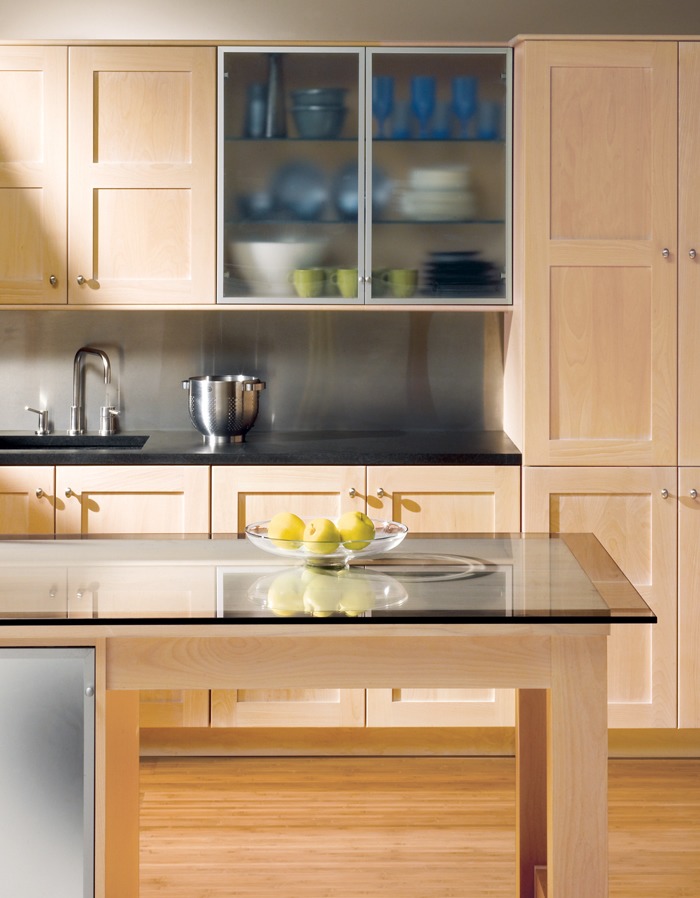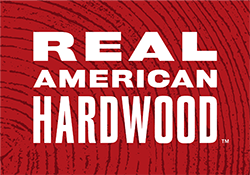Top Trends in Hardwood Kitchen Cabinetry
A kitchen provides physical and spiritual nourishment, and for many homes is now the heart and soul of family life.” That’s how Terence Conran opened his classic Kitchen Book twenty years ago, and it’s probably even truer today. The kitchen’s central importance in most households means that Americans are paying more attention than ever to the design and decoration of this vital space-a search for functionality, comfort, and beauty that’s reflected in current trends in hardwood kitchen cabinetry.
“We’re seeing increasing demand for rift-sawn white oak cabinets,” says Brian Yahn, Sales Manager of Plain & Fancy Custom Cabinetry in Schaefferstown, Pennsylvania. The reasons for rift-sawing oak are not just practical (it produces very stable boards that are especially resistant to warping and shrinking, an important consideration in moist kitchen environments) but also aesthetic: It results in a distinctive grain-tight, straight, and even-that takes neutral or light stains exceptionally well. “This is not your grandmother’s oak,” Yahn continues. “Today it’s being used to create kitchens that are sleek and modern but also warm and inviting.” Treated this way, the venerable hardwood gives contemporary homeowners the best of both worlds-cabinetry that’s clean-lined, efficient, and durable yet still exudes a natural, organic quality.
Many customers are also requesting white oak cabinets that have been either cerused (limed) or wire-brushed, two textured finishes that produce an understated rustic look that’s a little bit country, but not too much so. In fact “understatement”-or the impulse to keep things light and simple-is another watchword with today’s kitchens. Not as austere as the minimalist look that was trending a few years ago, light-and-simple refers to the design as well as the finish or color of the hardwood cabinetry: Shaker-style recessed-panel doors in blond beech or white-painted maple are the classic example of this turn toward a bright, uncluttered kitchen environment. The pale, unified palette allows the straightforward details, unfussy hardware, and honest materials to create their full harmonious effect.
The trend toward simplicity and understatement can be seen in more elaborately embellished kitchen cabinetry too. While add-ons such as carved feet, undercounter corbels, and crown moldings, or decorative flourishes like turned legs, raised panels, and fancy cutouts are still in demand, they are noticeably more constrained and smaller-scaled than they would have been a decade ago. “Homeowners don’t want decorative detailing that’s over the top,” Yahn notes. Carving is quieter and less ostentatious; lines are simpler and less convoluted. Restrained decorative embellishments produce hardwood cabinetry that evokes kitchens of an earlier, more expansive era while integrating seamlessly into modern American family life.

A Plain & Fancy Custom Cabinetry kitchen with Shaker-like cabinets and table-style island in Beech with a hand-rubbed “White Frost” finish. Photo courtesy of Plain and Fancy Custom Cabinetry.
Another way Americans are making the kitchen an even more central part of their homes is by installing cabinetry that looks like fine furniture. This can take multiple forms, ranging from totally freestanding pieces to kitchen islands that resemble tables to fitted cabinets that use furniture-emulating details. A current favorite is the stand-alone armoire, whose drawers can be used to store silverware, table linens, and serving pieces, while its upper portion is ideal for housing a flat-screen television. Made of painted maple, it will exude an easy country vibe; fashioned in stained cherry or black walnut, it will become a handsome heirloom-quality piece. A bulky kitchen island can be transformed into an open, airy worktable by removing the base and replacing it with elegantly turned legs. And furniture-style drawer pulls and door handles on wall and base cabinets bring the atmosphere of the living room into the kitchen.
The pleasing visual diversity normally found in a living room can be introduced into the kitchen by using different finishes on different pieces of cabinetry. Many homeowners are using this strategy when faced with the classic kitchen layout in which a central island is surrounded by walls of cabinetry: Monotony, which threatens if all the hardwood is finished in exactly the same way, is avoided by staining some of it-the island, for example-and painting the rest of the cabinets. “We’re often asked for a dark-stained cherry or black walnut island and a perimeter of white-painted maple cabinets,” Yahn says. And of course it’s always possible to highlight an individual piece or a particular section of cabinetry by using a distinctive stain or paint color.
No matter what style of kitchen you favor, from the warmly traditional to the sleekly modern, American hardwoods in all their diversity will allow you to realize that vision perfectly.

